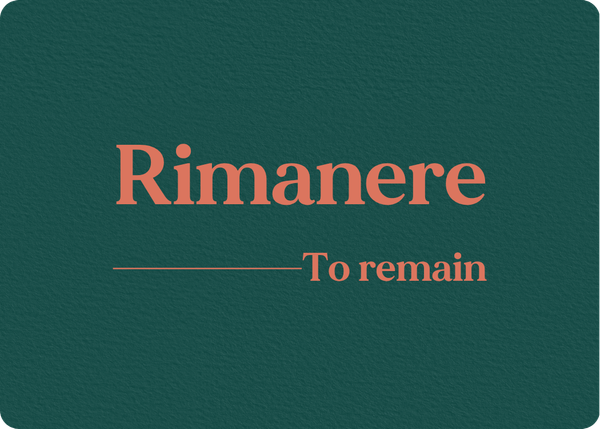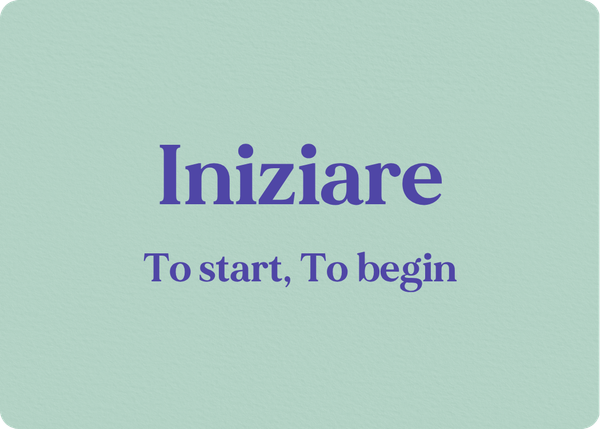What is Rimanere?
Rimanere is an irregular Italian verb meaning "to remain", "to stay", or "to be left". It belongs to the second conjugation (-ERE verbs) but follows irregular patterns in some tenses. This verb is useful for expressing permanence, duration, and what remains in Italian conversation and is commonly used to indicate staying in a place or condition.
Key Features of Rimanere:
- Type: Irregular second conjugation verb (-ERE)
- Meaning: To remain, to stay, to be left
- Irregularities: Present tense (rimango, etc.), simple past (rimasi, etc.), future (rimarrò), present subjunctive (rimanga, etc.), conditional (rimarrei), past participle (rimasto)
- Auxiliary verb: Uses "essere" (to be) for conjugation in compound tenses
- Past participle: Rimasto
Indicativo – Indicative Mood
Presente (Present Tense)
| Person | Conjugation |
|---|---|
| io | rimango |
| tu | rimani |
| lui/lei | rimane |
| noi | rimaniamo |
| voi | rimanete |
| loro | rimangono |
Example:
Rimango sempre a casa la domenica per rilassarmi.
I always stay home on Sundays to relax.
Passato Prossimo (Present Perfect)
| Person | Conjugation |
|---|---|
| io | sono rimasto/a |
| tu | sei rimasto/a |
| lui/lei | è rimasto/a |
| noi | siamo rimasti/e |
| voi | siete rimasti/e |
| loro | sono rimasti/e |
Example:
Siamo rimasti al ristorante a chiacchierare fino alla chiusura.
We stayed at the restaurant chatting until closing time.
Imperfetto (Imperfect)
| Person | Conjugation |
|---|---|
| io | rimanevo |
| tu | rimanevi |
| lui/lei | rimaneva |
| noi | rimanevamo |
| voi | rimanevate |
| loro | rimanevano |
Example:
Durante l'università, rimanevo sempre sveglio fino a tardi per studiare.
During university, I always used to stay awake until late to study.
Trapassato Prossimo (Past Perfect)
| Person | Conjugation |
|---|---|
| io | ero rimasto/a |
| tu | eri rimasto/a |
| lui/lei | era rimasto/a |
| noi | eravamo rimasti/e |
| voi | eravate rimasti/e |
| loro | erano rimasti/e |
Example:
Quando siamo usciti dall'aula, erano rimasti solo pochi studenti.
When we left the classroom, there were only a few students left.
Passato Remoto (Simple Past)
| Person | Conjugation |
|---|---|
| io | rimasi |
| tu | rimanesti |
| lui/lei | rimase |
| noi | rimanemmo |
| voi | rimaneste |
| loro | rimasero |
Example:
A causa di quello sciopero, i passeggeri rimasero fermi in aeroporto per ore.
Due to that strike, passengers remained stuck at the airport for hours.
Trapassato Remoto (Past Anterior)
| Person | Conjugation |
|---|---|
| io | fui rimasto/a |
| tu | fosti rimasto/a |
| lui/lei | fu rimasto/a |
| noi | fummo rimasti/e |
| voi | foste rimasti/e |
| loro | furono rimasti/e |
Example:
Dopo che fu rimasto solo, decise di trasferirsi in città.
After he had been left alone, he decided to move to the city.
Futuro Semplice (Simple Future)
| Person | Conjugation |
|---|---|
| io | rimarrò |
| tu | rimarrai |
| lui/lei | rimarrà |
| noi | rimarremo |
| voi | rimarrete |
| loro | rimarranno |
Example:
Questo segreto rimarrà tra di noi per sempre.
This secret will remain between us forever.
Futuro Anteriore (Future Perfect)
| Person | Conjugation |
|---|---|
| io | sarò rimasto/a |
| tu | sarai rimasto/a |
| lui/lei | sarà rimasto/a |
| noi | saremo rimasti/e |
| voi | sarete rimasti/e |
| loro | saranno rimasti/e |
Example:
Quando sarai rimasto da solo, capirai l'importanza di avere degli amici.
When you’re left on your own, you’ll understand how important it is to have friends.
Congiuntivo – Subjunctive Mood
Presente (Present Subjunctive)
| Person | Conjugation |
|---|---|
| che io | rimanga |
| che tu | rimanga |
| che lui/lei | rimanga |
| che noi | rimaniamo |
| che voi | rimaniate |
| che loro | rimangano |
Example:
Spero che tu rimanga con noi per cena stasera.
I hope you stay with us for dinner tonight.
Passato (Past Subjunctive)
| Person | Conjugation |
|---|---|
| che io | sia rimasto/a |
| che tu | sia rimasto/a |
| che lui/lei | sia rimasto/a |
| che noi | siamo rimasti/e |
| che voi | siate rimasti/e |
| che loro | siano rimasti/e |
Example:
Credo che Giulia sia rimasta molto colpita dal film.
I believe Giulia was very impressed by the movie.
Imperfetto (Imperfect Subjunctive)
| Person | Conjugation |
|---|---|
| che io | rimanessi |
| che tu | rimanessi |
| che lui/lei | rimanesse |
| che noi | rimanessimo |
| che voi | rimaneste |
| che loro | rimanessero |
Example:
Se tu rimanessi qui con me, sarei molto felice.
If you stayed here with me, I would be very happy.
Trapassato (Past Perfect Subjunctive)
| Person | Conjugation |
|---|---|
| che io | fossi rimasto/a |
| che tu | fossi rimasto/a |
| che lui/lei | fosse rimasto/a |
| che noi | fossimo rimasti/e |
| che voi | foste rimasti/e |
| che loro | fossero rimasti/e |
Example:
Se fossero rimasti nel vecchio appartamento, non avrebbero conosciuto i nuovi vicini.
If they had stayed in the old apartment, they wouldn't have met the new neighbors.
Condizionale – Conditional Mood
Presente (Present Conditional)
| Person | Conjugation |
|---|---|
| io | rimarrei |
| tu | rimarresti |
| lui/lei | rimarrebbe |
| noi | rimarremmo |
| voi | rimarreste |
| loro | rimarrebbero |
Example:
Rimarrei volentieri tutto il giorno qui, ma devo andare.
I’d gladly stay here all day, but I’ve got to go.
Passato (Past Conditional)
| Person | Conjugation |
|---|---|
| io | sarei rimasto/a |
| tu | saresti rimasto/a |
| lui/lei | sarebbe rimasto/a |
| noi | saremmo rimasti/e |
| voi | sareste rimasti/e |
| loro | sarebbero rimasti/e |
Example:
Sarei rimasto a pranzo con voi, ma avevo già un altro impegno.
I would have stayed for lunch with you, but I already had another commitment.
Imperativo (Imperative)
| Person | Conjugation |
|---|---|
| (tu) | rimani |
| (lui/lei) | rimanga |
| (noi) | rimaniamo |
| (voi) | rimanete |
| (loro) | rimangano |
Example:
Rimani calmo e tutto si risolverà!
Stay calm and everything will work out!
Indefinite Moods
Infinito (Infinitive)
- Presente (Present): rimanere (to remain/to stay)
- Passato (Past): essere rimasto (to have remained/stayed)
Examples:
Mi piace rimanere in contatto con i vecchi amici.
I like to stay in touch with old friends.
Sono felice di essere rimasto fedele ai miei principi.
I'm happy to have remained faithful to my principles.
Participio (Participle)
- Presente (Present): rimanente (remaining) - used as an adjective
- Passato (Past): rimasto (remained/stayed)
Examples:
Il tempo rimanente non sarà sufficiente per finire il lavoro.
The remaining time won't be enough to finish the work.
Sono rimasto a casa tutto il weekend.
I stayed home all weekend.
Gerundio (Gerund)
- Presente (Present): rimanendo (remaining/staying)
- Passato (Past): essendo rimasto (having remained/stayed)
Examples:
Rimanendo concentrato sugli obiettivi, riuscì a realizzare i suoi sogni.
By remaining focused on his goals, he managed to achieve his dreams.
Essendo rimasto senza lavoro per mesi, decise di cambiare strada.
Having been unemployed for months, he decided to change paths.
The verb Rimanere at a glance: Key tenses you need
| Present | Present Perfect | Imperfect | Present Subjunctive | Imperfect Subjunctive | Present Conditional |
|---|---|---|---|---|---|
| io rimango | io sono rimasto/a | io rimanevo | che io rimanga | che io rimanessi | io rimarrei |
| tu rimani | tu sei rimasto/a | tu rimanevi | che tu rimanga | che tu rimanessi | tu rimarresti |
| lui/lei rimane | lui/lei è rimasto/a | lui/lei rimaneva | che lui/lei rimanga | che lui/lei rimanesse | lui/lei rimarrebbe |
| noi rimaniamo | noi siamo rimasti/e | noi rimanevamo | che noi rimaniamo | che noi rimanessimo | noi rimarremmo |
| voi rimanete | voi siete rimasti/e | voi rimanevate | che voi rimaniate | che voi rimaneste | voi rimarreste |
| loro rimangono | loro sono rimasti/e | loro rimanevano | che loro rimangano | che loro rimanessero | loro rimarrebbero |
Conclusion
Mastering the conjugation of "rimanere" is useful for expressing permanence, duration, and what remains in Italian. This irregular verb requires careful attention to its unique forms, particularly the irregular present tense (rimango, etc.), simple past (rimasi, etc.), and future/conditional stem (rimarr-).
Remember the key points:
- Uses "essere" as auxiliary verb for conjugation in compound tenses
- Irregular in some tenses
- Past participle is "rimasto"
- Essential for expressing states of being and remaining
- Fundamental for describing duration and permanence
Keep practicing with real sentences and contextual examples to master this Italian verb!





